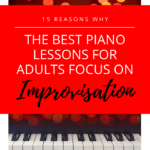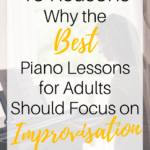Last Updated on June 1, 2022 by Rebecca
If you've ever thought to yourself, “I wish I had learned to play piano as a kid,” this post is for you!
Don't get me wrong, learning to read music and being able to perform familiar pieces are extremely valuable skills! I'm thankful every day that I know how to read sheet music becuase it means I can play anything I want. But it saddens me that piano education in the last 100 years or so has put so little emphasis on improvisation and creating your own music.
Thankfully, creativity is starting to make a come-back in piano education. Which is really great! And I want to help things along!

I truly believe that learning piano improvisation is the best way for you to experience the benefits of playing a musical instrument. But maybe you're not convinced…
So, without further ado, here are the 15 reasons why, in my opinion, the BEST piano lessons for adults should focus on improvisation!

1. You Learn More Complex Music, EARLIER
Everyone knows that the worst thing about learning piano as an adult is kids. You know the ones I mean. Those super talented 10-year-old kids who can already play Mozart and Beethoven and Chopin… while you’re working on Mary Had a Little Lamb.
You were proud of yourself, until that kid started playing.
Now you're hoping none of your friends and family will remember that you've been learning piano.
Nevermind that the kid has had 4 years of lessons while you've only been at it for a month… you're still not going to play in front of anyone after that kid's performance!
But it doesn't have to be like that!
With improvisation, you can learn how to create beautiful music… your own beautiful music… in a lot less time than it takes to learn to read music.
2. It Enables You to Play Anytime, Anywhere!
It’s a sad reality that many (and I mean many) young pianists dedicate years of their youth to the study of piano, then enter adulthood and never play the piano again.
If you’ve read my About page, you know that for a few years in my 20s, I was that person. And it sucked. It’s embarrassing having to admit you don’t remember how to play anything without sheet music in front of you!
Learning to improvise on the piano means never having to experience that again.
When you know how to improvise, you can literally play beautiful music anytime, anywhere. You don’t need to have sheet music in front of you. You don’t need to have any pieces memorized. You just need to sit down and let the music flow through your fingers like the magical piano-whisperer that you are!
3. It Fosters Creativity and Self-Expression
Creative expression is so important in life.
It’s rewarding to create beautiful things. And to share those beautiful things with others.
It’s relaxing to come home after a long day and unwind at the piano.
It’s satisfying to challenge your mind to reach and grow and come up with new creations.
It’s a huge relief to be able to take your emotions (the amazing ones and the not-so-great ones!) and pour them out into the piano.
And for people who are born creative, it’s just downright NECESSARY to find creative outlets that allow you to express your creativity. Stifled creative energy is the worst.
I love learning amazing pieces written by others, but creating my own music fulfills a whole other need in my creative soul.
4. You Develop Problem-Solving Skills
When you're playing improvisation, you’re brain is constantly in problem-solving mode!
With every note you play, you’re assessing if you're happy with the sound, identifying the problem (if you hit a note you’re not happy with), considering possible next steps and their potential outcomes, choosing the best one, acting on it, then assessing if you were happy with the outcome, and cycling through the whole process again.
And it gets to the point where you’re doing all this on auto-pilot! How’s that for problem-solving skills!
5. You Develop Quick-Thinking Skills
All that problem solving I just mentioned? Yeah, you're doing that at lighting speed when you improvise!
You don't exactly have a lot of time between the notes you play. Sure, you can buy yourself some time by holding a note for a few beats… but that's about it. You need to decide what your next note (or series of notes!) will be, and you need to decide fast!! And once you get into it, making these split-second decisions really isn't scary at all; it just becomes second-nature!
6. You Develop a Positive Attitude
Let’s face it… when you play improvisation, you’re going to hit some unexpected notes that don’t sound at all like what you were going for. And you’re going to have to figure out a way to keep going and make your music sound good. As if you MEANT to play that note all along.
Your ability to accept and embrace the unexpected notes that show up in piano improvisation without losing your cool will translate into your non-piano life as well. Little set-backs in life that used to get you all worked up will suddenly start to feel like no big deal!
7. You Develop a DEEP Understanding of Musicality and Music Theory
With improvisation, you build a very solid understanding of the building blocks of music. You learn about scales, chords, styles, rhythm, techniques, tempo, dynamics, articulation, etc… and how all these building blocks fit together to create music. It’s an incredibly deep level of understanding that you just don’t get if you only ever play other people’s music.
8. It Makes Learning Music Theory FUN!
I'm pretty sure your eyes started glazing over while you read my last point.
All too many piano students have known the drudgery of playing scales, triads, arpeggios, etc. over and over again. Drilling them into their brains, into their fingers, in the very fiber of their piano souls… all without understanding the significance of these technical drills!
It becomes very boring when you don’t understand how these drills relate to actual music. And they do relate! In such a BIG way!
In improvisation, you learn your scales, triads, arpeggios, etc. But in learning them, you use them to create music! So, they're never boring technical drills… instead, they are creative exercises full of joy, expression, and exploration!
9. You Don't Need Sheet Music!
You can learn to improvise beautiful pieces of music without ever learning to read sheet music.
Now don’t get me wrong. Sheet music is not the enemy! I love sheet music!
If you love playing the piano, you should definitely learn to read sheet music. In my opinion, it is the fastest way to learn new pieces.
But it’s not the fastest way to begin your piano journey.
And it definitely should never be the only way you learn music.
If that were the case, you'd end up chained to your sheet music and unable to play without it. (And let's be honest… nobody's carrying sheet music around in their back pocket “just in case” they run into a piano!)
Learning piano is like learning a new language. And playing improvisation is like speaking that language conversationally. If you learned a new language, but couldn't speak it conversationally with other people, you'd feel pretty embarrassed, wouldn't you?
10. It Will Make Learning to Read Sheet Music EASIER
Think about the way we learn to read. We sound out the letters until we recognize the word, and then a lightbulb flashes in our brains, and BAM! we've just learned to read a new word. Our pre-existing knowledge of the the spoken language makes the written language much easier to learn.
And music is no different! Just think how much easier and faster it will be to learn to read sheet music if you already understand music theory and techniques!
11. The Musical Possibilities Are ENDLESS!
First of all, let's just get one thing straight… improvisation is not just for jazz and blues! You can improvise in any style or genre that suits your mood on any given day!
Secondly, you have a natural understanding of rhythm and melody inside you. You just do. You've been experiencing music your whole life, so you've already learned a lot on an instinctive level. There are complex rhythms in your musical soul just waiting to come out!
With improvisation, playing these complex rhythms is simple. You just play them and they come out naturally.
If you tried to read these same rhythms in musical notation, you'd find them very challenging.
Improvisation allows you to express the music inside you, without being limited by your ability (or inability!) to read music. It sets you free!
12. Simple Things Sound Impressive
So many people fall into the trap of thinking there are only 2 levels of piano: either you can play Listz’s Hungarian Rhapsody No. 2, or you can’t play anything worth playing.
Which is SO not true!
There is a whole spectrum of piano skill levels, and you’d be surprised how little it takes to impress the general public!
With improvisation, you can easily learn to do relatively simple things that sound more complex than they are. It doesn't take much to create beautiful music that will be appreciated by everyone around you!
13. Improvisation Is an Excellent Jumping-Off Point for Pop Music and Hymns (Hello, Christmas Carols!… if that's your thing)
The skills and theory you learn in piano improvisation are directly applicable to learning pop music, church hymns, and Christmas carols.
After you master the basics of piano improvisation, it will blow your mind how easy it is to learn popular songs, especially if you're interested in playing sing-along versions!
Before you know it, you’ll be the star of your next family party, getting everyone to gather around the piano and sing your favourite songs!
14. It Is So Easy to Improvise with Others in Jam Sessions!
Piano improvisation is so much fun with friends!
It’s so easy to get 2 or 3 people on the piano improvising together! And I can’t even begin to describe how much fun it is to share in the joy of music creation with others and feed off each others' impromptu creations!
You can even get friends to join in with other instruments!
15. Piano Improvisation Is FUN!
Did I mention that playing piano improvisation is fun?
Because it is!
It’s REALLY fun!
If you don't believe me, prove me wrong. I dare you! 😉
Learn to improvise, then sit down, let your fingers go, and just TRY to walk away from your piano without a smile on your face!

Related Posts:
- Piano Triads: How to Read Root/Quality Chord Symbols and Slash Chords
- How to Practice Piano Chords [5 EASY Techniques + 3 FREE Resources!]
- How to Build Any Piano Triad… in Seconds! [An Illustrated Guide]
- Piano Buying Guide: How to Choose the Right Piano for YOU!
- Will Piano Key Stickers Help Me Learn to Play Piano?
You might also appreciate my FREE online piano course, Confused Beginner to Confident, Creative Piano Learner.
What do you think?
Now it's time for my favourite part… I want to know what you think! Which of these 15 reasons resonates the most with you! Are there any reasons I've left out? Share your thoughts in the comments!





Hi Rebecca, I used to practice playing the piano a long time ago. I quit because I wasn’t very good at it. I wish I came across your blog earlier for all the useful tips, especially on making music theory more fun through improvisation. Thank you for this post! I might pick up playing the piano again as a hobby 🙂
Hi Ye Chen, Thanks for your feedback! I’m so sorry you had a discouraging early experience with piano. I definitely encourage you to try it from a creative and improvisational approach if you do decide to take it up again as a hobby. It’s so much fun to create your own music! Keep checking back as my blog grows if you’re interested in reading more about piano! 🙂